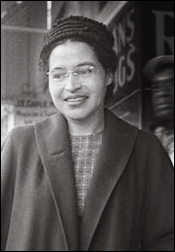The Story of Rosa Parks
In the
 Rosa Parks was born in 1913 in Alabama. At that time, all over America, African American citizens were treated unjustly because of racial prejudice. In southern states, the injustice took the form of segregation laws. These laws forced African Americans to go to separate schools, eat at separate restaurants, and even drink from drinking fountains other than the ones caucasian people used. The laws also forced African American passengers on trains and buses to sit in the back. The laws were unfair, and everyone knew it. But African American citizens who disobeyed them were punished severely.
Rosa Parks was born in 1913 in Alabama. At that time, all over America, African American citizens were treated unjustly because of racial prejudice. In southern states, the injustice took the form of segregation laws. These laws forced African Americans to go to separate schools, eat at separate restaurants, and even drink from drinking fountains other than the ones caucasian people used. The laws also forced African American passengers on trains and buses to sit in the back. The laws were unfair, and everyone knew it. But African American citizens who disobeyed them were punished severely.
Rosa and her husband, Raymond, worked very hard to make a living. But her anger about the unjust way that African Americans were treated gave her the energy to work with young people in her spare time. She also coached other African Americans to help them pass tests that were intended to make it difficult for them to vote.
One day in 1955, Rosa was riding the bus home from her job when a caucasian man ordered her to move to the back of the bus. Gently but firmly, Rosa refused to move. The bus driver had her arrested, just as she knew he would. She was put in jail.
All the people Rosa had helped over the years became angry when they heard the news. Led by a young minister named Martin Luther King Jr., the other African American citizens of Montgomery, Alabama, decided they would not ride the buses
Rosa Parks' courage was the beginning of the Civil Rights Movement in the United States. Soon other people, angry about injustice, began staging "sit-ins" at lunch counters that refused to serve African Americans. Many people took part in marches to protest unfair treatment.
There is still racial prejudice in America. But because Rosa Parks knew how to use her anger wisely, no one is forced to ride in the back of the bus today. Rosa died on October 24, 2005, but young people continue her work through the Rosa and Raymond Parks Institute for Self Development. She founded the Institute with money that was given to her as an award for her work in civil rights.

